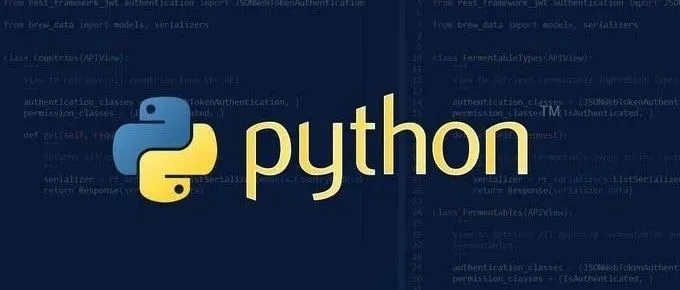Python由于语言的简洁性,让我们以人类思考的方式来写代码,新手更容易上手,老鸟更爱不释手。
要写出 Pythonic(优雅的、地道的、整洁的)代码,还要平时多观察那些大牛代码,这里明哥收集了一些比较常见的 Pythonic 写法,帮助你养成写优秀代码的习惯。
1. 变量交换
交换两个变量的值,正常都会想利用一个中间临时变量来过渡。
- tmp = a
- a = b
- b = tmp
能用一行代码解决的(并且不影响可读性的),决不用三行代码。
- a,bb = b,a
2. 列表推导
下面是一个非常简单的 for 循环。
- my_list = []
- for i in range(10):
- my_list.append(i*2)
在一个 for 循环中,如果逻辑比较简单,不如试用一下列表的列表推导式,虽然只有一行代码,但也逻辑清晰。
- my_list = [i*2 for i in range(10)]
3. 单行表达式
上面两个案例,都将多行代码用另一种方式写成了一行代码。
这并不意味着,代码行数越少,就越 Pythonic 。
比如下面这样写,就不推荐。
- print('hello'); print('world')
- if x == 1: print('hello,world')
- if <complex comparison> and <other complex comparison>:
- # do something
建议还是按照如下的写法来
- print('hello')
- print('world')
- if x == 1:
- print('hello,world')
- cond1 = <complex comparison>
- cond2 = <other complex comparison>
- if cond1 and cond2:
- # do something
4. 带索引遍历
使用 for 循环时,如何取得对应的索引,初学者习惯使用 range + len 函数
- for i in range(len(my_list)):
- print(i, "-->", my_list[i])
更好的做法是利用 enumerate 这个内置函数
- for i,item in enumerate(my_list):
- print(i, "-->",item)
5. 序列解包
使用 * 可以对一个列表解包
- a, *rest = [1, 2, 3]
- # a = 1, rest = [2, 3]
- a, *middle, c = [1, 2, 3, 4]
- # a = 1, middle = [2, 3], c = 4
6. 字符串拼接
如果一个列表(或者可迭代对象)中的所有元素都是字符串对象,想要将他们连接起来,通常做法是
- letters = ['s', 'p', 'a', 'm']
- s=""
- for let in letters:
- s += let
更推荐的做法是使用 join 函数
- letters = ['s', 'p', 'a', 'm']
- word = ''.join(letters)
7. 真假判断
判断一个变量是否为真(假),新手习惯直接使用 == 与 True、False、None 进行对比
- if attr == True:
- print('True!')
- if attr == None:
- print('attr is None!')
实际上,""、[]、{} 这些没有任何元素的容器都是假值,可直接使用 if not xx 来判断。
- if attr:
- print('attr is truthy!')
- if not attr:
- print('attr is falsey!')
8. 访问字典元素
当直接使用 [] 来访问字典里的元素时,若key不存在,是会抛异常的,所以新会可能会先判断一下是否有这个 key,有再取之。
- d = {'hello': 'world'}
- if d.has_key('hello'):
- print(d['hello']) # prints 'world'
- else:
- print('default_value')
更推荐的做法是使用 get 来取,如果没有该 key 会默认返回 None(当然你也可以设置默认返回值)
- d = {'hello': 'world'}
- print(d.get('hello', 'default_value')) # prints 'world'
- print(d.get('thingy', 'default_value')) # prints 'default_value'
9. 操作列表
下面这段代码,会根据条件过滤过列表中的元素
- a = [3, 4, 5]
- b = []
- for i in a:
- if i > 4:
- b.append(i)
实际上可以使用列表推导或者高阶函数 filter 来实现
- a = [3, 4, 5]
- b = [i for i in a if i > 4]
- # Or:
- b = filter(lambda x: x > 4, a)
除了 filter 之外,还有 map、reduce 这两个函数也很好用
- a = [3, 4, 5]
- b = map(lambda i: i + 3, a)
- # b: [6,7,8]
10. 文件读取
文件读取是非常常用的操作,在使用完句柄后,是需要手动调用 close 函数来关闭句柄的
- fp = open('file.txt')
- print(fp.read())
- fp.close()
如果代码写得太长,即使你知道需要手动关闭句柄,却也会经常会漏掉。因此推荐养成习惯使用 with open 来读写文件,上下文管理器会自动执行关闭句柄的操作
- with open('file.txt') as fp:
- for line in fp.readlines():
- print(line)
11. 代码续行
将一个长度较长的字符串放在一行中,是很影响代码可读性的(下面代码可向左滑动)
- long_string = 'For a long time I used to go to bed early. Sometimes, when I had put out my candle, my eyes would close so quickly that I had not even time to say “I’m going to sleep.”'
稍等注重代码可读性的人,会使用三个引号 \来续写
- long_string = 'For a long time I used to go to bed early. ' \
- 'Sometimes, when I had put out my candle, ' \
- 'my eyes would close so quickly that I had not even time to say “I’m going to sleep.”'
不过,对我来说,我更喜欢这样子写 使用括号包裹 ()
- long_string = (
- "For a long time I used to go to bed early. Sometimes, "
- "when I had put out my candle, my eyes would close so quickly "
- "that I had not even time to say “I’m going to sleep.”"
- )
导包的时候亦是如此
- from some.deep.module.inside.a.module import (
- a_nice_function, another_nice_function, yet_another_nice_function)
12. 显式代码
有时候出于需要,我们会使用一些特殊的魔法来使代码适应更多的场景不确定性。
- def make_complex(*args):
- x, y = args
- return dict(**locals())
但若非必要,请不要那么做。无端增加代码的不确定性,会让原先本就动态的语言写出更加动态的代码。
- def make_complex(x, y):
- return {'x': x, 'y': y}
13. 使用占位符
对于暂不需要,却又不得不接收的的变量,请使用占位符
- filename = 'foobar.txt'
- basename, _, ext = filename.rpartition('.')
14. 链式比较
对于下面这种写法
- score = 85
- if score > 80 and score < 90:
- print("良好")
其实还有更好的写法
- score = 85
- if 80 < score < 90:
- print("良好")
如果你理解了上面的链式比较操作,那么你应该知道为什么下面这行代码输出的结果是 False
- >>> False == False == True
- False
15. 三目运算
对于简单的判断并赋值
- age = 20
- if age > 18:
- type = "adult"
- else:
- type = "teenager"
其实是可以使用三目运算,一行搞定。
- age = 20
- b = "adult" if age > 18 else "teenager"




































